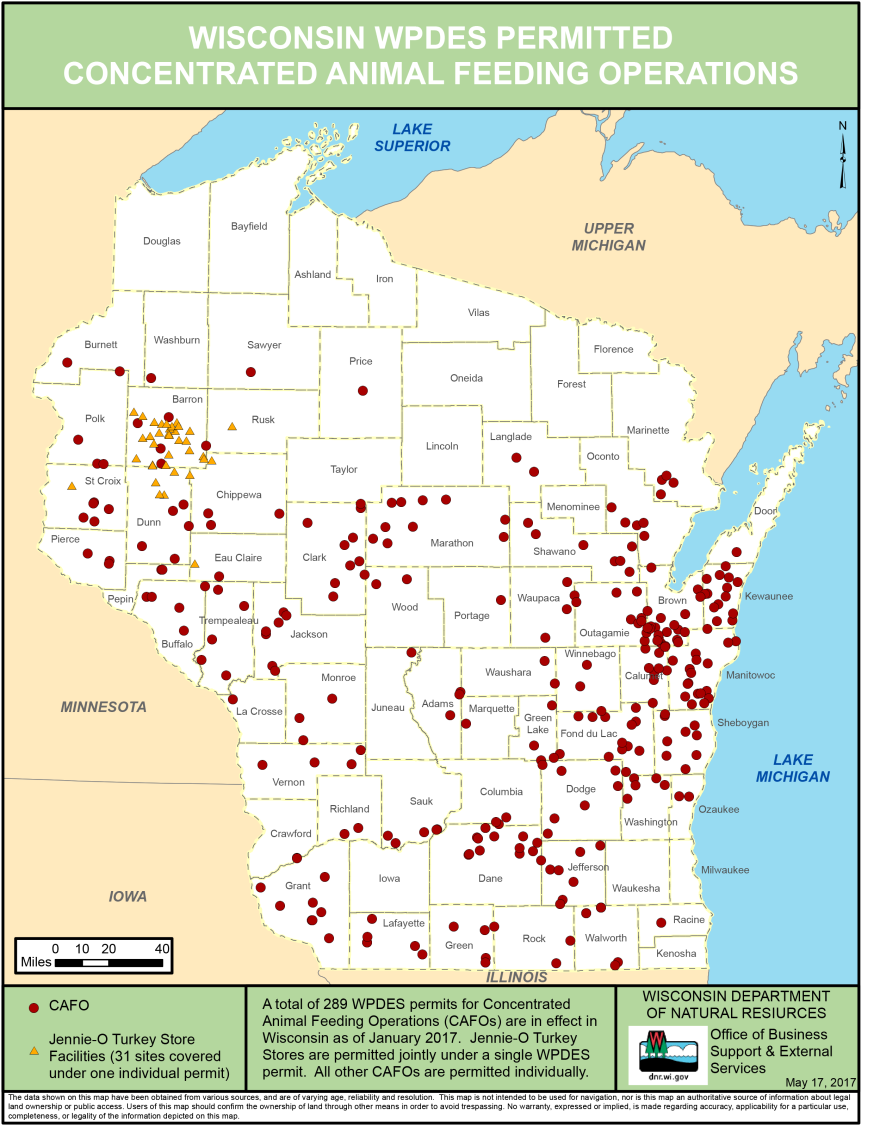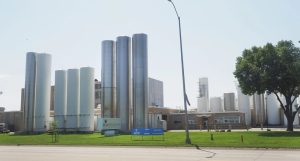
Today the Kinnard farm is one of Wisconsin’s largest CAFOS, or concentrated animal feeding operations. Kinnard is home to about 8,000 cows. They produce an estimated 103 million gallons of manure each year that’s spread out on 16,000 acres of land.
The farm could become even larger, nearly doubling the herd, pending permit changes the Department of Natural Resources is considering.
The permit review is part of a complicated case unfolding in a county that has long had drinking water issues.
Jodi Parins is concerned. She lives a few miles from the farm and says fellow Town of Lincoln residents have been grappling with contaminated private wells for years.
“In 2013, our groundwater was already in crisis mode at a 33% contamination rate,” Parins said. She testified at a recent DNR hearing about proposed changes to the Kinnard Farm permit.
Changes would include allowing more cows — up to twice as many. The farm would be required to monitor groundwater beneath some of the fields where it spreads manure, but the farm would not have to spell out its monitoring plan until after the permit approval.
Manure spreading is common, but regions like Kewaunee County are especially susceptible to groundwater contamination. The soils can be very shallow, and the bedrock beneath is fractured.
Pathogens from manure spread on fields with that geology, called karst, can quickly travel into and contaminate well water.
Parins accused the DNR of abdicating responsibility by considering the permit modifications.“The court has given you the go-ahead. Why wouldn’t you use the decision to actually protect our water instead of continuing to protect the polluters,” she said.
Parins referred to a state Supreme Court ruling handed down in July 2021. It came after years of concerns raised by Kewaunee County residents about the Kinnard farm’s impacts on groundwater.
The court said the DNR has the authority to cap the farm’s herd and put conditions on its pollutant discharges, manure and wastewater.
A November 2021 memo from the agency states, “Groundwater monitoring at the Kinnard production site shows persistent exceedances of groundwater quality standards for nitrate and bacteria.”
Tyler Dix is the DNR’s permit coordinator for CAFOS. Dix said the farm would only be allowed to expand “if they can demonstrate compliance with liquid storage capacity and nutrient management requirements.”
Dix added, “To be perfectly clear, we have not received any sort of application to actually add animal units at this time.”
To be clear, Kinnard’s is not the only CAFO in the Town of Lincoln as there are several along with more than a dozen smaller farms.

In 2021, the township completed a 73-page groundwater and surface water protection report. It states, “75% of Lincoln Township lands are inappropriate for the spreading of liquid manure, agriculture wastewater, municipal waste and whey in the manner in which they have been applied in the past.”
Jesse Jerabek said his concern for his community stretches beyond his own contaminated well. Jerabek is Lincoln’s town chairman.
“I think permitting or allowing an expansion … without first requiring a comprehensive monitoring plan and confirming the potential impact to our drinking water is simply negligent on the part of the DNR. I would be negligent if I did not personally go on record against these modifications as currently written,” he said.
People outside Kewaunee County spoke at the hearing, including Edie Ehlert. “I live in southwest Wisconsin. We have the karst geology issues and we have a permit here that you’re looking now for a large hog CAFO here. We are looking at this permit as being frightening,” Ehlert said.
“We have a CAFO proposed on the Polk / Burnett County border,”Polk County supervisor Amy Middleton said. “Polk County is home to 437 lakes and the St. Croix River, which is the nation’s first wild and scenic river.”
Middleton called the proposed Kinnard permit changes precedent setting. “We need to get the water testing correct. We need a robust baseline and ongoing groundwater testing program to be included in this permit. The rest of the state is watching, and I wanted to relay to you that citizens are asking for this water protection at all levels of government and at all corners of Wisconsin,” Middleton said.
WUWM reached out to Kinnard Farm but did not receive a comment or interview for this story. But the farm touts its stewardship of the land on the company’s website. There’s a statement that says although the farm has grown and changed over the years, “the family’s passion for the animals and commitment to caring for the environment has not.”
In a video, Lee Kinnard states, “Our goal, as a family, has been to always leave the land in a condition better than it was in which we found it.”
The deadline for public comment on the Kinnard permit was Tuesday. Now the issue is in the hands of the DNR.
The proposed effective date of the modified permit is Feb. 1, but DNR CAFO permit coordinator Tyler Dix said given the magnitude of comments the DNR has received, the date may be pushed back.

























